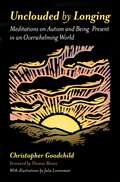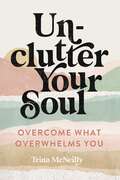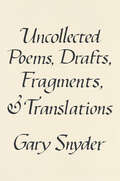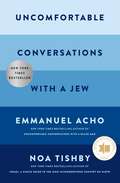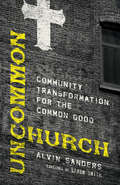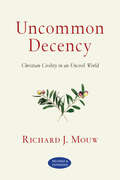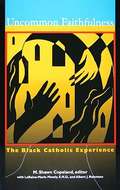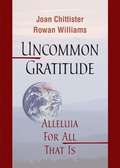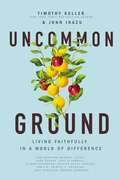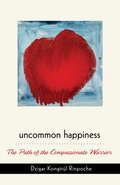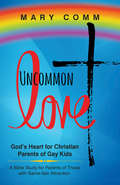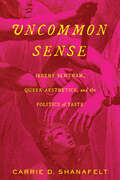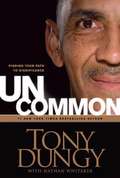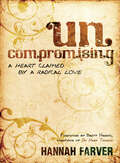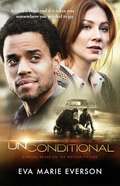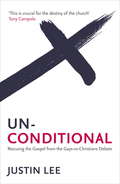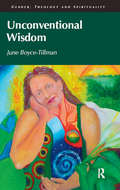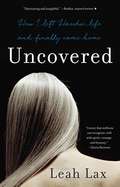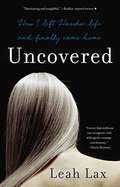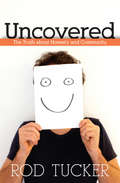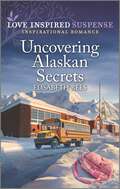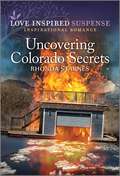- Table View
- List View
Unclouded by Longing: Meditations on Autism and Being Present in an Overwhelming World
by Thomas Moore Christopher Goodchild Julie Lonneman'Truth waits for eyes unclouded by longing.' Lao-Tzu (poet and philosopher) In this collection of short, contemplative, enlightening reflections, qualified spiritual director and Quaker elder Chris Goodchild, inspired by his own experiences, guides you through his spiritual and philosophical journey to his truest and most peaceful self. Written from a 'soul' perspective, the book reveals how, by looking beyond vulnerability to see innate strength, and searching beyond pain and turmoil to find peace and serenity, anyone can affirm their true humanity despite the hardships and distractions of modern life. Goodchild's compassionate route through difficulties, doubt, grief and fear is marked with dynamic tenderness and an artful embrace of abundant sources of wisdom. Spirituality, psychology and philosophy are seamlessly woven together in an inclusive Quaker context, led by the common values of love and forgiveness. In a world increasingly weighed down with the baggage of the self, this book will speak to anyone searching for a more clear-sighted, meaningful presence in the eternal universe.
Unclutter Your Soul: Overcome What Overwhelms You
by Trina McNeillyA unique biblical and practical approach to uncluttering our internal thoughts and feelings.We all want our lives to change for the better–to become the healthiest versions of ourselves in spirit, soul, and body. Yet we still struggle. Author Trina McNeilly, looking for order in her own life, embarked on an inward journey to the home of her heart and soul to find healing and health from the inside out.Unclutter Your Soul is for all of us who are cluttered and overwhelmed with loss, fear, chronic stress, unhealthy coping mechanisms, crippling depression, or anxiety. With the Holy Spirit as our guide, Trina says we can learn toobserve: acknowledge the clutter,own: make space for a healthy internal environment, andovercome: take action with tools for living clutter-free from the inside out.Each chapter in these three sections is written as an essay and concludes with practical and soulful tips as well as prompts to put them into action. With discussion questions and a prayer guide, Unclutter Your Soul is the ultimate resource for finding freedom in our everyday lives by releasing limited mindsets and creating more space for peace and joy.
Uncollected Poems, Drafts, Fragments, and Translations
by Gary SnyderA collection of previously uncollected and unpublished works by a Pulitzer Prize-winning Beat poet Gary Snyder, written during his most productive and important yearsFar from being a simple miscellany of poems, Uncollected Poems, Drafts, Fragments, and Translations contains some of Gary Snyder&’s best work, written during his most productive and important years.Many of these have been published in magazines or as broadsides, including Spel Against Demons, Dear Mr. President, Hymn to the Goddess San Francisco, Smokey the Bear Sutra, A Curse on the Men in Washington, Pentagon. The collection also includes a great number of translations from Chinese and Japanese poets. Much of this work has been gleaned from journals, manuscripts and correspondence, and never before published in any form.
Uncomfortable Conversations with a Jew
by Emmanuel Acho Noa TishbyNEW YORK TIMES BESTSELLER From two New York Times bestselling authors, a timely, disarmingly honest, and thought-provoking investigation into antisemitism that connects the dots between the tropes and hatred of the past to our current complicated moment. For Emmanuel Acho and Noa Tishby no question about Jews is off-limits. They go there. They cover Jews and money. Jews and power. Jews and privilege. Jews and white privilege. The Black and Jewish struggle. Emmanuel asks, Did Jews kill Jesus? To which Noa responds, &“Why are Jewish people history&’s favorite scapegoat?&” They unpack Judaism itself: Is it a religion, culture, a peoplehood, or a race? And: Are you antisemitic if you&’re anti-Zionist? The questions—and answers—might make you squirm, but together, they explain the tropes, stereotypes, and catalysts of antisemitism in America today. The topics are complicated and Acho and Tishby bring vastly different perspectives. Tishby is an outspoken Israeli American. Acho is a mild-mannered son of a Nigerian American pastor. But they share a superpower: an uncanny ability to make complicated ideas easy to understand so anyone can follow the straight line from the past to our immediate moment—and then see around corners. Acho and Tishby are united by the core belief that hatred toward one group is never isolated: if you see the smoke of bigotry in one place, expect that we will all be in the fire. Informative and accessible, Uncomfortable Conversations with a Jew has a unique structure: Acho asks questions and Tishby answers them with deeply personal, historical, and political responses. This book will enable anyone to explain—and identify—what Jewish hatred looks like. It is a much-needed lexicon for this fraught moment in Jewish history. As Acho says, &“Proximity breeds care and distance breeds fear.&”
Uncommon Church: Community Transformation for the Common Good
by Alvin SandersHow can the people of God develop churches in ways that help and don't hurt poor neighborhoods? In urban ministry, Christians too often treat the poor as goodwill projects instead of people. Because of this mindset, many remain unchurched. Healthy, local, urban churches are needed because they combine personal empowerment and community transformation. Every poor neighborhood needs uncommon churches that will seek the common good of their communities. Alvin Sanders engages hard truths about these neighborhoods and provides a model for how to do ministry in difficult conditions. The local, urban church is the key to community transformation, as it plays three crucial roles of empowering, partnering, and reaching. Pastors and church planters interested in Christian community development will find here practical insights into the power of the local church, which is often underrated. Churches can serve their communities and improve the quality of life of every facet of the neighborhood.
Uncommon Decency: Christian Civility in an Uncivil World
by Richard J. MouwCan Christians act like Christians even when they disagree? In these wild and diverse times, right and left battle over the airwaves, prolifers square off against prochoicers, gay liberationists confront champions of the traditional family, artists and legislators tangle, even Christians fight other Christians whose doctrines aren't "just so." Richard Mouw has been actively forging a model of Christian civil conversation with those we might disagree with—atheists, Muslims, gay activists and more. He is concerned that, too often, Christians have contributed more to the problem than to the solution. But he recognizes—from his dialogues with those from many perspectives—that it's not easy to hold to Christian convictions and treat sometimes vindictive opponents with civility and decency. Few if any people in the evangelical world have conversed as widely and sensitively as Mouw. So few can write more wisely or helpfully than Mouw does here about what Christians can appreciate about pluralism, the theological basis for civility, and how we can communicate with people who disagree with us on the issues that matter most.
Uncommon Faithfulness: The Black Catholic Experience
by M. Shawn Copeland LaReine Marie Mosely Albert RaboteauAn engaging study of black catholics, their contributions to the Catholic church, and the challenges they face. <P><P> These essays describe the experience of black Catholics in this country since their arrival in North america in the sixteenth century ujtil the present day. The essays highlight the difficulties black Catholics faced in their early attempts to join churches and enter religious communities, their participation in the civil rights struggle, and the challenges they face today as they seek full inclusion in the church, whether in terms of liturgical practice or pastoral ministry.
Uncommon Gratitude: Alleluia for All That Is
by Joan Chittister Archbishop Rowan WilliamsArchbishop of Canterbury Rowan Williams often says that, no matter what, the proper stance of the Christian in the world is one of gratitude. In this book, Sister Joan Chittister, OSB, and Archbishop Rowan Williams offer us a sweeping set of things and circumstances to be grateful.
Uncommon Ground: Living Faithfully in a World of Difference
by Timothy Keller John InazuBestselling author Timothy Keller and legal scholar John Inazu bring together a thrilling range of artists, thinkers, and leaders to provide a guide to faithful living in a pluralistic, fractured world.How can Christians today interact with those around them in a way that shows respect to those whose beliefs are radically different but that also remains faithful to the gospel? Timothy Keller and John Inazu bring together illuminating stories--their own and from others--to answer this vital question. Uncommon Ground gathers an array of perspectives from people thinking deeply and working daily to live with humility, patience, and tolerance in our time. Contributors include:LecraeTish Harrison WarrenKristen Deede JohnsonClaude Richard AlexanderShirley HoogstraSara GrovesRudy CarrascoTrillia NewbellTom LinWarren KinghornProviding varied and enlightening approaches to reaching faithfully across deep and often painful differences, Uncommon Ground shows us how to live with confidence, joy, and hope in a complex and fragmented age.
Uncommon Happiness
by Marcia Binder Schmidt Dzigar KongtrulFrom 2005 to 2007, teacher Dzigar Kongtrül Rinpoche gave classes on Buddhist scholar Shantideva’s The Way of the Boddhisattva at a noted retreat center in Northern California. His commentaries revealed such a deep understanding that practitioner Marcia Binder Schmidt decided to collect them for other students of Buddhism as an independent work. This book is the result. Beginning with an overview of the entire path of Buddhism, Kongtrül Rinpoche goes on to examine different aspects of Shantideva’s text, always relating the teachings to individual experience. He explores in depth the training of the four immeasurables—equanimity, loving kindness, compassion, and sympathetic joy—and discusses the importance of wholehearted engagement in the process. His advice for setting up and maintaining a spiritual practice is both practical and inspiring. Although the book contains three years of teachings, it remains remarkably compact, reflecting Kongtrül Rinpoche’s characteristic directness and emphasis on implementation. In the words of the editor, “Dharma practice needs to be more than mere theory. Dharma needs to be trained in, integrated into our lives, and embraced by wisdom.” Uncommon Happiness contains the guidance to undergo that training with the right attitude of clarity and commitment.
Uncommon Happiness
by Dzigar Kongtrul RinpocheDzigar Kongtrul guides us through intelligent reasoning to identify our deluded perception of a truly existing self and shows us the key to awakening from this fundamental confusion. Rinpoche's brilliant commentary on the classical Indian Buddhist text, The Way of the Bodhisattva by Shantideva is a testament to this inspiring teacher's compassionate and compelling style. Uncommon Happiness is saturated with advice from an adept practitioner of the Buddhist Path. By expounding the essential meaning of the engaged Buddhism and introducing skillful methods to utilize along the way, he reveals our innate wisdom mind and challenges us to meet and employ our intrinsic enlightened capacity.In this extraordinary book, we have the unique opportunity to connect with a realized teacher, renown for his compassion and kindness, who skillfully teaches us how to reach that same level of conviction and certainty in our self. This clarification overflows with the genuine delight and humanity Dzigar Kongtrul Rinpoche embodies. These qualities transcend time, race, and place and are universal principles for all people to live by.Here is a combination of primordial notions expounded in the 8th century and practiced throughout the world till the present time and a modern interpretation pertinent to contemporary audiences. These values include loving kindness, compassion, joy and impartiality as well as generosity, patience, discipline, morality, diligence, peaceful abiding and intelligence. Instructions to engage in these trainings are presented with clear and precise language, easy to comprehend and apply.
Uncommon Love: God's Heart for Christian Parents of Gay Kids
by Mary CommUncommon Love is a landmark Bible study and the first of its kind. In a culture where gay rights, gay marriage, and a surplus of gender issues have recently exploded in the media, more and more kids are coming out—and many of these are from Christian homes with Christian parents who don&’t know what to do, how to respond, where to draw boundaries or if they even should. Scripture, which is the foundational basis for how to live the Christian life, has even been brought into question, further confusing the hearts and minds of Christian parents. Mary Comm presents a comprehensive navigational map for Christian parents whose kids (whether minor or adult) have Same-Sex Attraction or are living the LGB lifestyle. The primary purpose of Uncommon Love is to help parents maintain a loving, mutually respectful relationship with their LGB children and shows parents how to offer compassionate understanding and unconditional love without compromising their own identity, faith, and values.
Uncommon Sense: Jeremy Bentham, Queer Aesthetics, and the Politics of Taste
by Carrie D. ShanafeltInfamous for authoring two concepts since favored by government powers seeking license for ruthlessness—the utilitarian notion of privileging the greatest happiness for the most people and the panopticon—Jeremy Bentham is not commonly associated with political emancipation. But perhaps he should be. In his private manuscripts, Bentham agonized over the injustice of laws prohibiting sexual nonconformity, questioning state policy that would put someone to death merely for enjoying an uncommon pleasure. He identified sources of hatred for sexual nonconformists in philosophy, law, religion, and literature, arguing that his goal of "the greatest happiness" would be impossible as long as authorities dictate whose pleasures can be tolerated and whose must be forbidden. Ultimately, Bentham came to believe that authorities worked to maximize the suffering of women, colonized and enslaved persons, and sexual nonconformists in order to demoralize disenfranchised people and prevent any challenge to power.In Uncommon Sense, Carrie Shanafelt reads Bentham’s sexual nonconformity papers as an argument for the toleration of aesthetic difference as the foundation for egalitarian liberty, shedding new light on eighteenth-century aesthetics and politics. At odds with the common image of Bentham as a dehumanizing calculator or an eccentric projector, this innovative study shows Bentham at his most intimate, outraged by injustice and desperate for the end of sanctioned, discriminatory violence.
Uncommon: Finding Your Path To Significance
by Tony Dungy Nathan WhitakerSuper Bowl-winning coach and #1 New York Times best selling author Tony Dungy has had an unusual opportunity to reflect on what it takes to achieve significance. He is looked to by many as the epitome of the success and significance that is highly valued in our culture. He also works every day with young men who are trying to achieve significance through football and all that goes with a professional athletic career-such as money, power, and celebrity. Coach Dungy has had all that, but he passionately believes that there is a different path to significance, a path characterized by attitudes, ambitions, and allegiances that are all too rare but uncommonly rewarding. Uncommon reveals lessons on achieving significance that the coach has learned from his remarkable parents, his athletic and coaching career, his mentors, and his journey with God. A particular focus of the book: what it means to be a man of significance in a culture that is offering young men few positive role models.
Uncompromising: A Heart Claimed By a Radical Love
by Hannah FarverAsk any girl on the street what womanhood is about, and you&’ll get a blank stare in return. No one knows. Young women are devoid of vision beyond popularity, material wealth, a cute boyfriend or a dream career. Even in Christian circles, significant questions are often left unanswered: What&’s the point of purity? Modesty? Femininity? What&’s biblical womanhood? Most of all, girls wonder at the longing in their souls for something greater.Uncompromising: A Heart Claimed By a Radical Love cuts straight to the heart of young womanhood. Rather than setting up rules, it pulls at the desire in every woman&’s heart to live a life of purpose, fully surrendered to His radical love. Written in an edgy teen voice, Uncompromising is a collection of &“field notes&” from the author&’s own search for answers…and the story of how she stumbled upon the one Cause worth dying for. Contains study questions for group or individual use.
Uncompromising: A Heart Claimed By a Radical Love
by Hannah FarverAsk any girl on the street what womanhood is about, and you&’ll get a blank stare in return. No one knows. Young women are devoid of vision beyond popularity, material wealth, a cute boyfriend or a dream career. Even in Christian circles, significant questions are often left unanswered: What&’s the point of purity? Modesty? Femininity? What&’s biblical womanhood? Most of all, girls wonder at the longing in their souls for something greater.Uncompromising: A Heart Claimed By a Radical Love cuts straight to the heart of young womanhood. Rather than setting up rules, it pulls at the desire in every woman&’s heart to live a life of purpose, fully surrendered to His radical love. Written in an edgy teen voice, Uncompromising is a collection of &“field notes&” from the author&’s own search for answers…and the story of how she stumbled upon the one Cause worth dying for. Contains study questions for group or individual use.
Unconditional Equality: Gandhi's Religion of Resistance (Cultural Critique Books)
by Ajay SkariaUnconditional Equality examines Mahatma Gandhi&’s critique of liberal ideas of freedom and equality and his own practice of a freedom and equality organized around religion. It reconceives satyagraha (passive resistance) as a politics that strives for the absolute equality of all beings. Liberal traditions usually affirm an abstract equality centered on some form of autonomy, the Kantian term for the everyday sovereignty that rational beings exercise by granting themselves universal law. But for Gandhi, such equality is an &“equality of sword&”—profoundly violent not only because it excludes those presumed to lack reason (such as animals or the colonized) but also because those included lose the power to love (which requires the surrender of autonomy or, more broadly, sovereignty).Gandhi professes instead a politics organized around dharma, or religion. For him, there can be &“no politics without religion.&” This religion involves self-surrender, a freely offered surrender of autonomy and everyday sovereignty. For Gandhi, the &“religion that stays in all religions&” is satyagraha—the agraha (insistence) on or of satya (being or truth).Ajay Skaria argues that, conceptually, satyagraha insists on equality without exception of all humans, animals, and things. This cannot be understood in terms of sovereignty: it must be an equality of the minor.
Unconditional: A Novel
by Eva Marie EversonSamantha Crawford, an acclaimed storybook artist, seemingly had it all until losing the love she cherished most. Now fighting despair, she is obsessed with tracking down the murderer of her husband. With no leads and no hope, Sam prepares to take her life until providence intervenes and she is reunited with her childhood friend, Joe Bradford. <p>Dying of kidney disease, Joe spends his last days serving fatherless children in an under resourced community. Observing Papa Joe's tireless love for “his kids,” Sam begins to find new purpose until she comes face to face with her heart's desire. The innocence and hope of a child competes with the lure of revenge in an effort to show Sam how, even in life's darkest of circumstances, Love is above all.
Unconditional: Rescuing the Gospel from the Gays-vs-Christians Debate
by Justin Lee'Gay.The word seemed to hold the weight of eternity within its single syllable.As strange as it may seem, in all the years I had struggled with my sexuality, the idea that I could be 'gay' had simply never crossed my mind. I was a Christian! That was my whole life! And Christians weren't gay.'This could be the most important book you read this year.It's a memoir.An exploration of what is, and what could be.Most of all, it's a clarion call to the church - to rediscover the love that Jesus called us to. Unconditionally.'So many gay, lesbian, bisexual, and transgender people give up on Christianity because they cannot reconcile who they are with what they were brought up to believe that the Bible teaches about sexuality. Here is a wonderfully told story of a brave young homosexual man who has struggled to hold onto his faith while still affirming himself as gay. This is a must-read.' Tony Campolo
Unconventional Wisdom (Gender, Theology and Spirituality)
by June Boyce-TillmanEarly Christianity saw women in positions of authority and a fluid theology that included feminine figures in the notion of the Divine. However, for centuries a male trinity has dominated theology with the characteristics of triumphalism, clarity, order, eternality and unity. Unconventional Wisdom examines the attempt within the last half of the twentieth century to unearth the hidden theological tradition of feminine Wisdom. The book presents the work of influential theorists, notably Foucault, Belenky and Dorothy Smith. The recovery of the feminine in the divine is linked with the rediscovery of subjugated value systems and what this might mean for ecclesiology.
Uncovered: How I Left Hasidic Life and Finally Came Home
by Leah LaxA naive Texas girl is drawn in to a group of Hasidic Jews with their promises of eternal love. Uncovered is Leah Lax's moving chronicle of thirty years as a covered woman among them, beginning with an arranged marriage, all the while holding a secret that will set her free. She raises a large family under strict Hasidic rules but discovers that this life doesn't satisfy her psychologically and sexually. And in the end she leaves the community, finds a female lover and finds peace. A well written book with deep psychological insight.
Uncovered: How I Left Hasidic Life and Finally Came Home
by Leah LaxUncovered is the only memoir to tell of a gay woman leaving the hasidic fold. Told in understated, crystalline prose, Leah Lax begins her story as a young teen leaving her secular home to become a hasidic Jew, then plumbs the nuances of her arranged marriage, fundamentalist faith, and hasidic motherhood as, all the while, creative, sexual, and spiritual longings tremble beneath the surface.
Uncovered: The Truth about Honesty and Community
by Rod TuckerGreg was homeless. As he walked through the park one day, he was surrounded by people. Good people. Caring people. Christian people. People doing ministry. But people totally oblivious to Greg. No one saw him, talked to him, noticed him, or tried to minister to him. The Christians were preoccupied--working hard on the ministry they were putting together--a ministry intended to provide help and healing to the most vulnerable in their city, a ministry designed to reach . . . the homeless! How do Christians, benefactors of the overwhelming grace of an immeasurably generous God, fail so miserably at showing and distributing--of all things--grace? In voice and style evocative of Donald Miller and Scot McKnight, yet with a message all his own, Rod Tucker explores how we Christians have become masters of self-deceptive and fake moral living. Just like Adam and Eve, we don't want anyone to know we are spiritually naked. But covering up around God denies us the freedom of his grace. Until we can be honest with ourselves, honest with God, and honest with others, daily grace will continue to elude us, either as gift received or as gift given. We remain trapped in our Botox spirituality until we come to grips with exactly who we are.
Uncovering Alaskan Secrets
by Elisabeth ReesA missing persons investigation… and a fight for their lives. Police chief Dani Pearce&’s investigation of a missing twelve-year-old girl has made her some unexpected enemies in her small Alaskan town. Saved from a near-death attack by secretive newcomer Simon Walker, she&’s finding his unexplained expertise suspicious. But with time running out and threats on every corner, Dani and Simon must trust each other enough to solve this crime—or risk becoming victims.From Love Inspired Suspense: Courage. Danger. Faith.
Uncovering Colorado Secrets
by Rhonda StarnesGetting to the truth could be deadly… With her sister and brother-in-law murdered, it&’s up to bodyguard Adeline Scott to keep her twin nephews safe from a killer&’s crosshairs. So when an intruder breaks into their home and threatens them, she turns to her security expert boss, Linc Jameson, for help. But will they track down the answers as to what really happened before a killer strikes again?From Love Inspired Suspense: Courage. Danger. Faith.
